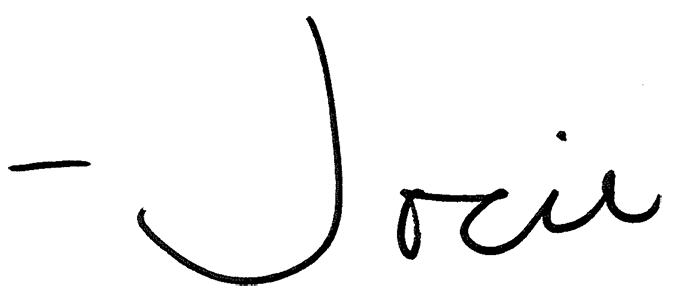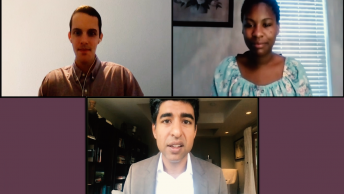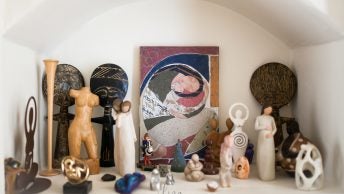In October, I had the opportunity to meet a few of the women working at Accompany Doula Care, an independent doula agency based in Massachusetts. In addition to providing culturally and linguistically appropriate care to birthing people and working to integrate doula care into the healthcare system, Accompany is also creating a sustainable and supportive model for their doulas. I recently chatted with Alejandra, Lorenza, Christina, and Allison to learn more about the founding of Accompany and their vision for doula care.

Jocie: Thank you all so much for taking the time to chat with me today. Can we start with some brief introductions?
Alejandra: This is Alejandra Garcia. I’m a public health professional and also a doula. I have been a doula for the last three to four years. I am a co-founder of Accompany Doula Care and a board member of Boston Association for Childbirth Education (BACE). The way I got into this field was that I was working in Venezuela in the operating room system, and I saw many c-sections and labors. They were just regular procedures to me, but then I had the opportunity to see a procedure when a doula was present, and specifically a c-section, and I noticed the difference and the change that makes, and that’s when I decided to implement a program in the hospital where I was working. After setting up the program, I decided to come here and learn more about it. That’s when I met Christina at Boston University School of Public Health (BUSPH) and she connected me with Lorenza, and we started working together.
Lorenza: My name is Lorenza Holt. I too am a birth doula. I have been a birth doula for about 25 years. I am also a birth doula approved trainer with DONA International and an approved trainer with Spinning Babies. I am a co-founder of Accompany Doula Care. In my journey for the last 25 years, I have been the founder and director for the Cambridge Doula Program, a group of doulas with the Cambridge midwives at the Cambridge Birth Center. It’s a multilingual program we started in 1995. And I also managed the Birth Sisters program at Boston Medical Center after I got my degree in public health at BUSPH. I am so proud of the work that Accompany is doing. I’m hopeful – I see political will, societal will, and an enormous need, so I am very excited at this point in time and am hopeful that we’re going to do this.
Christina: This is Christina Gebel. I’ve been a birth doula since 2011. I’m also a childbirth educator and a maternal child health professional as well.
Allison: And this is Allison Monroe. I’m the newbie on the team. I am a brand new doula, so I’ve only observed one birth, and I am a marketing professional, so I am helping the team with communications, social media, and getting the word out.
Jocie: It’s so great to meet you all. Thank you for taking the time to talk to me. I’d like to first start by hearing more about the founding of Accompany. What was your motivation for doing so and how did you go about starting the group?
Lorenza: Starting in the 1990s, I worked at two hospital-based doula programs where I saw that hospitals are not really supporting doulas the way we would like, and I wondered if we could do this work through the non-profit world. So I joined Boston Association for Childbirth Education and the Nursing Mothers Council (BACE-NMC) as their Executive Director for ten years. During that time, I met Christina while she was at BUSPH, and we started talking then about doula care for Medicaid families around the country and we started looking at what other states were doing. That was 2013 when Christina and I worked together. She did her practicum with BACE and did some wonderful evaluation and research into what was going on around the country. And we kept talking about this common dream, and then two and a half years ago a group of us started meeting on a more regular basis to say if this was our collective vision and we know women of color need and would benefit from doulas and there are these glaring gaps and inequities in our healthcare system, how can we find an insurance company that would be willing to pay for this service? We want doulas to be earning a living wage, we want doula care to be sustainable, we want to be able to train and supervise and mentor our doulas. We know how to do it right, but how do we find the partnerships we need to build up this coalition needed to make this happen? And that’s when a colleague who was working at an insurance company reached out and said that they would like to provide services to their members and asked if we were interested.
Since then, more students have come and done internships with us to look at this. Christina then worked with getting the March of Dimes involved. The Blue Cross Blue Shield Foundation of Massachusetts gave us the money for Accompany to do some branding, so we did some work with Health Resources in Action and got some support around strategic thinking and planning. And as these opportunities have become available, we have been building Accompany from a dream to a reality. BACE-NMC is our fiscal agent, and we launched in April 2019 and have received referrals.
Alejandra: We have around 20 doulas that speak 10 languages and we have many years of collective experience. We have had I believe over 20 births so far. In a short matter of eight months we have had growth and achieved so much, and now we are preparing to enter our second contract in the new year and we’re excited to see how it will take off.
Allison: One of the things that is so critical to what all of the founders have talked about is not just providing doula care as a service but helping people get trained to become doulas and so they can continue in that language and culture-specific tradition that we’re hoping to establish. It’s really about workforce opportunity. Lorenza I’m channeling you as I talk, I hear you say this a lot. It’s really an important legacy that the company is founded on.
Lorenza: We’re excited. We were at the table with Mass Health, we were at the table with legislators. We have been at many tables that we wouldn’t have been able to if we hadn’t been building our community of invested stakeholders and really diversifying in that community. And yes, we have the big picture vision. Not just hiring doulas, but how do we train and supervise and mentor doulas to be able to be professionals within a complex health care system? And because we want to reach into communities of color, the language capacity and racial and cultural diversity of our group is so important. We want to make sure that as we think forward in developing a state-wide workforce, what does that workforce of trainers look like? And how do we get the stakeholders in our state to come together and really start talking about the kind of curriculum that is needed in training community doulas that will be prepared to serve our diverse communities in ways that are linguistically and culturally welcoming to everybody? We don’t want to end up in a situation where we have white trainers training communities of color, so there is a huge commitment on our part to get this right. Where the doulas are being paid a living wage and it is a good job for them and there is a career ladder and like any other worker in the state that they have job security, benefits, and health coverage.
Jocie: It’s really incredible to see how much you all have accomplished in such a short time.
Christina: Ale, would you like to talk about why we chose to be business to business and why we decided to be an independent organization that contracts with the health care system? I think those are two other things that set us apart along with the living wage and not paying doulas as independent contractors like many other programs do.
Alejandra: Yeah, we looked long into this and we debated the pros and cons of how to set up this program the right way. So Lorenza had a lot of experience where she worked very hard to implement a program within a hospital system and then the finances of the hospital would come into trouble, and the first program they get rid of is the doula program.
And as for implementing these programs as an independent program – well, at the same time, it was when all the Accountable Care Organization systems were being implemented, so it was the right timing because the hospitals had an incentive to implement the doula services because it is financially right for them. We contract only with hospitals or insurance companies and not with private clients because private clients can easily find doulas. There are multiple doulas on the market, but who we really want to serve are those patients who can benefit the most from the doula services, and they don’t even know that they have this opportunity.
Lorenza: We did a lot of work considering if we wanted to be for profit or not for profit, independent contractors versus employees. All of these are very intentional decisions. In my experience, doulas need and want a lot of support. Working within a team, especially when working with vulnerable populations is very important, so the doula is not out there holding the enormous responsibility on her own. The role of the supervisor of the doulas is a role we take very seriously so the doulas feel they have someone to process a difficult birth, they can be mentored, etc. If they encounter a mother who needs extra services or support, we also have the capacity to help that individual connect to additional resources. So working with the insuring companies and having those conversations about what to do when the family needs more and how do we share that obligation is very important.
Alejandra: It would have been easier to have contractors, but we really believed in building the worker and building the doula profession, so we wanted to take that responsibility and being committed to the employment laws and what they entail.
Lorenza: And demanding accountability for our doulas. I think a lot of healthcare systems are worried about who the doulas are, are they working in their scope of practice, do they have a code of ethics, and so we are able to train our doulas around the appropriate code of ethics and scope of practice of a doula. We’re able to assure our contracted partners that we understand patient confidentiality, we understand HIPAA laws, we have infrastructure that allows us to communicate in secure servers, we have the proper consent forms, etc. I think that’s really important for health care systems. Right now we’re assessing how much this actually costs. Not just paying the doula a sustainable wage but also paying the supervisor a living wage as well as covering the cost of this necessary infrastructure. We’re learning a ton, and we’re building the case for what it looks like to do it right and how can that be sustainable and how can it be replicable.
Jocie: That’s incredible. It’s so inspiring to hear what you’re implementing for the doulas at Accompany. There are a lot of companies that advocate for fair wages and benefits for others but aren’t always introspective about their own organizations and practices, and it’s incredible to hear the work that you’re doing for your own employees.
Alejandra: Yes, from the beginning, we were clear that we wanted to train our doulas in all the social determinants of health but this has been a prevalent issue that comes up with the communities that we’re serving. So we are looking at this very closely because it’s a concern for everyone involved.
Lorenza: Another training we’re thinking about is what happens when a doula witnesses systemic racism and the birthing family experiences systemic racism. How do we take it to the next place? How do we shine a light on that, and how do we engage our health care system in that dialogue in a way that they can hear it? That they can learn from this experience and see themselves how I will assume unintentional. So those are conversations we’re curious about and could see in a year or two – what would that workshop look like? What would that continuing ed look like? And not just for the doulas but all of us working with birthing families. How do we listen to each other and how do we get to a better place together by having these real conversations in real time?
Jocie: Yeah, that’s fantastic, and it seems like you have an amazing wealth of resources there with your doulas and an ability to learn with and from each other. So I’m curious about the client-doula relationship from start to finish. You talked about talking to the insurance companies, what does that all look like in practice?
Alejandra: I can give you an overview of the workflow. We receive a referral from an insurance company and we match this referral with our doulas – the main doula and the backup doula. We base this on language, culture, neighborhood, community, and we try our best to match as closely as possible to the family they are serving. That and also any social determinants or any condition they are going through like single mothers or substance abuse or sexual trauma, if we can match it to a doula who knows how to work in that space, we will do that as well. Our doulas do a couple of prenatal visit, and we as much as possible try to be there at the birth, and then we do a couple of postpartum visits or more if necessary. So in these prenatal visits, we try to build a relationship and educate the family around the options and we try to learn as much as possible about them and what they need and then we go to the birth. At the postpartum visits, we go through the best feeding options, determine if they have any needs, and also evaluate any signs of postpartum depression.
Building a relationship with these clients is sometimes harder. Usually when you think about doulas, it’s clients who hire doulas because they know what a doula is and they want these services. But these populations that we are serving, their insurance company is offering them these services. Some of them know what a doula is and some of them are like “a what?” so then we have a challenge of telling them what a doula is, we’ll tell them we can visit at their home. Some of them don’t want to, so some of them we meet at Dunkin Donuts or something, so building that relationship is a different challenge from ones private doulas might encounter. We really want to mitigate that challenge, so we want to educate more people about what a doula is and that we are really there for them.
Jocie: So we only have a few minutes left. Is there anything we haven’t touched on that you’d like to talk about or any final thoughts?
Lorenza: I’m totally interested in the concept of empowerment and bringing empowerment to birth. I think doulas are really important here because when you put a doula that has built a trusting relationship with the mother in the room, the voice of the woman will be heard in a way that will go silent without a doula. And the system is very intimidating and it has a lot of protocols and priorities that take over the birth process. But when you have a doula that is witnessing, listening, understands the wishes, desires, priorities, fears, and the birth plan of the family, she and can bring you back to her voice. I don’t care what language, what culture, what socio-economic background a woman has, when you put a doula in the room, the voice of the birthgiver is heard in a very different way.
Jocie: Yes, thank you and I think that’s what we hope to show in the blog, is the different strategies that we can all use to help women achieve more dignity in childbirth and change the system to be more dignified and empowering for birthing people’s choices. It’s really powerful to hear everything you’re doing not just for your clients but for your doulas as well.
Alejandra: I think that we right now are in a very exciting time and I really hope for the day when the whole system changes and the providers are seeing birth from a different perspective. One thing that inspired me from a meeting at Ariadne a few weeks ago was hearing an OB/Gyn saying that she recognizes certain things she used to do that were wrong. And she really committed to change her practice. And I’m like, wow, imagine if all the providers could think that way and imagine that every family that wants one would have a doula. Imagine what a different world that would be. Because everything starts with birth.
Lorenza: When I train doulas I like to put up a series of questions for them where I ask about the power of giving birth or being delivered: Who is in control? Who has the power? Who has the knowledge? Who feels the triumph? Who keeps the memory? Who protects the new family? And who assumes the consequences? And when I train doulas, I ask them to think about that – should it be the mother, the partner, the provider, the nurse, who really should be in control and how do we start giving women the right, the trust, the power to be in control of their own bodies and what’s done to them, when, and how? So that’s how I’d like to leave, is with those questions.
Jocie: Well thank you so much! I’ve learned so much and am inspired by your work.



